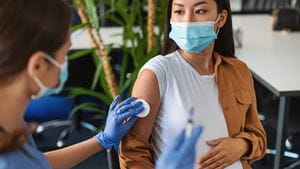
Respiratory Syncytial Virus (RSV) is a contagious illness that affects infants and young children in particular. Around the world, approximately 102,000 children die from RSV each year – about half of whom are less than six months old.
RSV is currently accounting for the majority of respiratory infections in the Rochester area, according to testing results at Rochester General Hospital.
A new RSV vaccine created by Pfizer is showing promise in reducing the spread and severity of the virus after the company released the results of a recent clinical trial.
Emil Lesho, DO, is the Program Director of Healthcare Epidemiology at Rochester Regional Health, and Steven Schulz, MD, is Rochester Regional Health’s Pediatric Medical Director for Monroe County and Finger Lakes Medical Associates. Together, they explain the clinical trial for the vaccine, how it works, and what comes next.
RSV bronchiolitis is a viral respiratory illness that can be characterized by serious respiratory distress.
Infants and children who are sickened by RSV often have a runny nose, cough, and fever – and can develop labored breathing.
“Our main concern is when a child is working hard to breathe – nasal flaring, wheezing or using their neck and stomach muscles – to the point where their breathing becomes labored and quick,” Dr. Schulz said. “When we listen to their lungs, children who are more severely affected with RSV have a mix of sounds that sound like asthma, bronchitis, and pneumonia.”
Currently, there is no designated treatment for RSV; providers can only administer fluids and oxygen if hospitalization is required. Most children can be managed with supportive care measures at home If approved, the Pfizer RSV vaccine would be the first in the world to help prevent the virus.
Starting in June 2020, Pfizer enrolled 7,400 pregnant women around the world between the ages of 18 and 49 in a clinical trial. Women were randomly given a single dose of either a placebo or the vaccine late in the second trimester or early in their third trimester.
After receiving their dose, women were followed for the rest of their pregnancy and six months after delivering their baby. Infants were followed for at least one year, with the majority being followed for two years.
Results of the trial showed 82 percent of babies were protected against severe medically attended lower respiratory tract illness from RSV in the first 90 days of life. That protection extended to 69.4 percent for infants over the age of six months.
The RSV vaccine is a bivalent RSV prefusion vaccine – meaning it uses two stabilized types of a specific protein that RSV uses to get into human cells.
Researchers found antibodies specific to this protein are very effective at blocking viral infections. With that in mind, researchers tested different versions of the protein (called prefusion F) and were able to combine two of them that help to create a strong anti-viral immune response.
The vaccine is administered to pregnant women in a single 120-unit dose. There were no safety concerns raised by researchers during the trial.
Now that the trial is complete, the results still need to be peer reviewed before they can be published in scientific journals.
Pfizer is also working to submit a Biologics License Application (BLA) to the FDA by the end of 2022.
A BLA requests that a company be allowed to distribute and market a vaccine in the U.S. The application contains preclinical and clinical data, and detailed descriptions of the manufacturing processes and the facility or facilities that will be used in manufacturing. The FDA will visit and inspect the manufacturing process as part of its review.
There is currently no estimated timeline for when the RSV vaccine would be reviewed for authorization and distribution.
“It is very promising and good news,” Dr. Lesho said. “Any additional preventative strategy we can use to help our community stay healthy and reduce the burden on our health care system means we can provide more care to more people. Every bit of prevention adds up.”